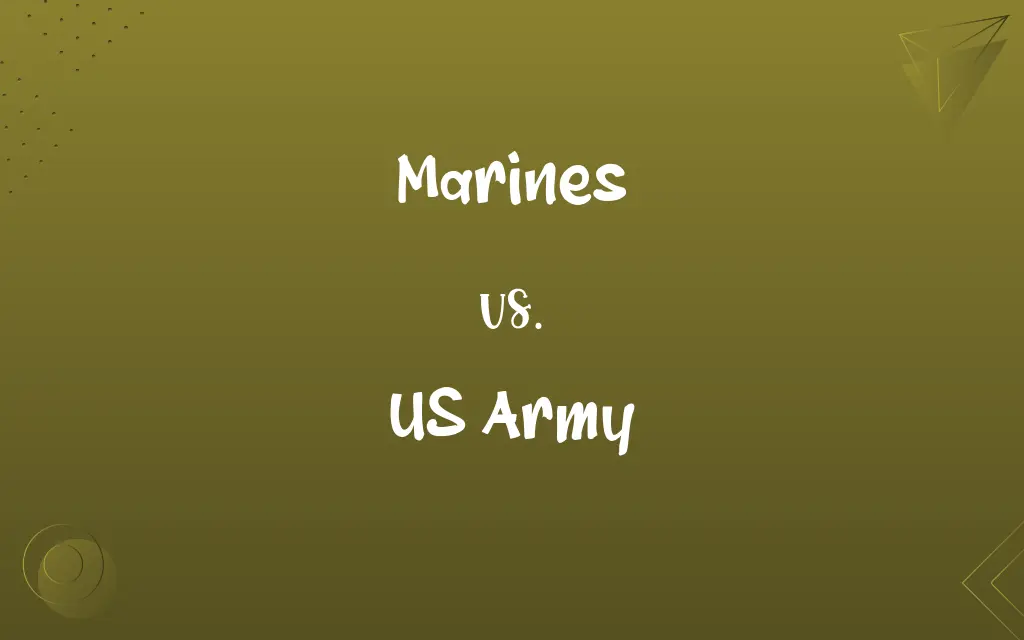Marines vs. US Army: Know the Difference

By Shumaila Saeed || Updated on December 25, 2023
The Marines are a rapid-response force specializing in amphibious operations, while the US Army is the main ground-force branch, handling a broader range of land-based military operations.

Key Differences
The Marines operate as an expeditionary force, trained for rapid deployments and amphibious assaults. The US Army is a larger branch responsible for sustained ground combat operations and a wider array of land-based missions.
Shumaila Saeed
Dec 21, 2023
The Marines are smaller and more agile, with a focus on versatility and rapid response. The US Army is larger and has a more extensive command and support structure, enabling it to conduct large-scale, sustained operations.
Shumaila Saeed
Dec 21, 2023
Marines are trained extensively in amphibious warfare and are known for their ability to quickly deploy to a crisis. The US Army, being more diverse, covers a wider range of military operations including artillery, armor, and infantry divisions.
Shumaila Saeed
Dec 21, 2023
The Marines, a part of the Department of the Navy, often operate alongside the Navy, providing a naval infantry component. The US Army operates under the Department of the Army and coordinates extensively with other military branches but is primarily a land force.
Shumaila Saeed
Dec 21, 2023
The Marines were established for ship-based security and amphibious combat, evolving into a rapid-reaction force. The US Army, with a broader historical role, has been the principal land combat force and has a wide range of specialized capabilities.
Shumaila Saeed
Dec 21, 2023
ADVERTISEMENT
Comparison Chart
Primary Role
Rapid-response, amphibious operations
Broad range of land-based military operations
Shumaila Saeed
Dec 21, 2023
Size and Structure
Smaller, agile, rapid deployment focus
Larger, extensive command and support structure
Shumaila Saeed
Dec 21, 2023
Specialization
Expertise in amphibious warfare
Diverse capabilities across various military operations
Shumaila Saeed
Dec 21, 2023
Integration with Other Forces
Part of the Department of the Navy, works closely with Navy
Operates under the Department of the Army, primarily land-focused
Shumaila Saeed
Dec 21, 2023
Historical Role
Originated for ship-based security and amphibious combat
Established as principal land combat force with diverse roles
Shumaila Saeed
Dec 21, 2023
ADVERTISEMENT
Marines and US Army Definitions
Marines
Marines are a branch of naval infantry specializing in amphibious operations.
The Marines swiftly executed the amphibious assault.
Shumaila Saeed
Dec 13, 2023
US Army
Specializes in ground warfare and sustained combat operations.
The US Army's expertise in ground warfare is unparalleled.
Shumaila Saeed
Dec 13, 2023
Marines
Marines operate as part of the Department of the Navy.
The Marines and Navy often conduct joint operations.
Shumaila Saeed
Dec 13, 2023
US Army
Historically, the US Army has been involved in major land battles and wars.
The US Army has played a crucial role in major historical conflicts.
Shumaila Saeed
Dec 13, 2023
Marines
They are trained extensively in amphibious warfare.
Marines are experts in launching operations from sea to land.
Shumaila Saeed
Dec 13, 2023
ADVERTISEMENT
US Army
The US Army is the main land combat force of the United States.
The US Army engaged in extensive land operations.
Shumaila Saeed
Dec 13, 2023
Marines
They act as a rapid response force for crisis situations.
The Marines were deployed immediately in response to the crisis.
Shumaila Saeed
Dec 13, 2023
US Army
The Army is equipped for a wide range of military operations.
The US Army's capabilities include everything from infantry to armored divisions.
Shumaila Saeed
Dec 13, 2023
US Army
It is the largest branch of the U.S. military.
The US Army has the most personnel among the military branches.
Shumaila Saeed
Dec 13, 2023
Marines
Relating to a system of oceanic habitats coextensive with the continental shelf, ranging from deep water to unprotected coastlines and characterized along its landward edge by exposure to wave action and tidal currents and by the absence of trees, shrubs, or emergent vegetation.
Shumaila Saeed
Dec 08, 2023
Marines
Of or relating to troops that serve at sea as well as on land, specifically the US Marine Corps.
Shumaila Saeed
Dec 08, 2023
Marines
The governmental department in charge of naval affairs in some nations.
Shumaila Saeed
Dec 08, 2023
Marines
Known for their expeditionary nature, Marines are ready for quick deployment.
Marines train for rapid deployment to global hotspots.
Shumaila Saeed
Dec 13, 2023
Repeatedly Asked Queries
How do the Marines differ from the US Army?
Marines specialize in rapid-response and amphibious warfare, while the US Army focuses on a wider range of ground-based military operations.
Shumaila Saeed
Dec 21, 2023
What is the US Army?
The US Army is the main ground-force component of the U.S. military, handling a broad range of land-based operations.
Shumaila Saeed
Dec 21, 2023
Are the Marines part of the Navy?
Yes, the Marines are a branch under the Department of the Navy.
Shumaila Saeed
Dec 21, 2023
How large is the US Army compared to the Marines?
The US Army is significantly larger than the Marines.
Shumaila Saeed
Dec 21, 2023
Do the Marines and US Army have different training?
Yes, their training is specialized based on their respective roles and operational needs.
Shumaila Saeed
Dec 21, 2023
What are the Marines?
The Marines are a branch of the U.S. military specializing in amphibious operations and rapid response.
Shumaila Saeed
Dec 21, 2023
What are the primary roles of the US Army?
The US Army's primary roles include sustained ground combat and a variety of land-based military operations.
Shumaila Saeed
Dec 21, 2023
How does the US Army contribute to national defense?
The US Army plays a crucial role in national defense through its diverse capabilities and size.
Shumaila Saeed
Dec 21, 2023
What kind of operations do the Marines specialize in?
The Marines specialize in amphibious operations and rapid deployment.
Shumaila Saeed
Dec 21, 2023
Can Marines operate independently of the Navy?
While part of the Navy, the Marines can operate independently as needed.
Shumaila Saeed
Dec 21, 2023
Are the Marines involved in international deployments?
Yes, the Marines are often deployed internationally for various operations.
Shumaila Saeed
Dec 21, 2023
What are the educational opportunities in the US Army?
The US Army offers various educational opportunities, including college programs and training.
Shumaila Saeed
Dec 21, 2023
What is the historical significance of the Marines?
The Marines have a historical role in ship-based security and rapid-reaction amphibious assaults.
Shumaila Saeed
Dec 21, 2023
How does the US Army support humanitarian missions?
The US Army often participates in humanitarian missions, providing aid and support.
Shumaila Saeed
Dec 21, 2023
Do the Marines have their own air support?
Yes, the Marine Corps operates its own aircraft and aviation units.
Shumaila Saeed
Dec 21, 2023
Does the US Army engage in amphibious operations?
While capable, amphibious operations are primarily the specialty of the Marines.
Shumaila Saeed
Dec 21, 2023
What types of weapons do the US Army use?
The US Army uses a wide array of weapons, from small arms to tanks and artillery.
Shumaila Saeed
Dec 21, 2023
What is the significance of the Marine Corps motto "Semper Fidelis"?
"Semper Fidelis," meaning "Always Faithful," signifies the Marines' loyalty and dedication.
Shumaila Saeed
Dec 21, 2023
What are the career paths available in the Marines and US Army?
Both offer diverse career paths, including combat roles, technical specialties, and support functions.
Shumaila Saeed
Dec 21, 2023
How do the Marines and US Army cooperate in joint operations?
They often cooperate in joint operations, leveraging each other's strengths for mission success.
Shumaila Saeed
Dec 21, 2023
Share this page
Link for your blog / website
HTML
Link to share via messenger
About Author
Written by
Shumaila SaeedShumaila Saeed, an expert content creator with 6 years of experience, specializes in distilling complex topics into easily digestible comparisons, shining a light on the nuances that both inform and educate readers with clarity and accuracy.








































































